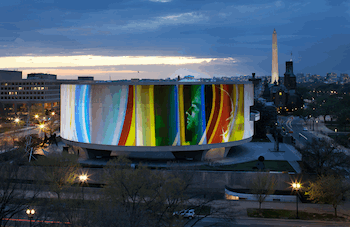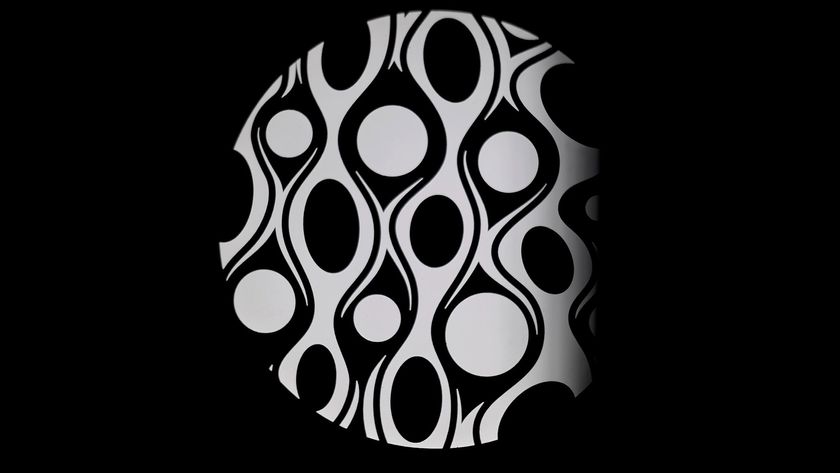WorldStage successfully delivered a complex projection and audio solution for “Song1,” artist Doug Aitken’s ambitious multimedia piece, which premiered on the cylindrical façade of the Smithsonian’s Hirshhorn Museum and Sculpture Garden.
WorldStage, the new brand for Scharff Weisberg and Video Applications, devised a system that enabled Aitken’s fluid video images to cascade across the entire surface of the Hirshhorn’s 725-foot wide circumference. “Song1” has been called the first work of 360º convex-screen cinema on this scale.
Aitken has said he wanted “Song1” to be an exercise in “liquid architecture,” and the Hirshhorn’s cylindrical façade seemed to disappear when it was transformed into an urban canvas for fluid images of rippling water, floating boats and cars streaming down liquid-metal highways. Accompanying the projections were singers performing a loop of arrangements of the 1930’s song, “I Only Have Eyes For You.”
WorldStage became involved with “Song 1” two-and-a-half-years ago when the company met with Aitken to discuss the feasibility of the project. Following a partial-scale test, WorldStage determined that, despite the size of the images and the obstacles to overcome, they could make the artist’s vision come to larger-than-life.
“We've been working with WorldStage on major installation projects for the last 6 years,” said Chris Totushek, producer, Doug Aitken Workshop. “Not only have they approached each project with experienced consideration and creative problem solving, but they take on each one of our large-scale installations as if it were one of their own. We've done enough with them to consider them family.”
The WorldStage solution required splitting Aitken’s images into 11 overlapping sections, one for each of 11 Christie Roadster S+20K DLP projectors. A total of 41,500 feet of fiber-optic cable transmitted the images from four Coolux Pandora media servers in the Hirshhorn’s basement to the projectors mounted on the museum’s perimeter wall.
WorldStage also provided and programmed the Pandora media servers and provided and installed the extensive outdoor audio system for the public art event. The company designed and fabricated custom mounts for the weatherproof equipment enclosures to ensure smooth operation in case of inclement weather.
“The Hirshhorn’s has done a number of innovative exhibitions recently but Song1 is by far the most technically complex,” said WorldStage president Josh Weisberg. “The project faced many challenges but the result places the Hirshhorn among the top tier of media-adept cultural institutions.
According to Weisberg the museum’s cylindrical façade was not that problematic in itself. “The actual façade is rather uniform and we’ve mapped projections to far more complex shapes in the past,” he said. “But the Hirshhorn’s façade is obscured in places by foliage, trees and the two large sculptures Snelson’s Needle Tower and Lichtenstein’s Brushstroke. After many hours working with a virtual 3D model of the site I was able to locate 11 projectors and predict that they could cover the entire façade seamlessly, with minimal shadowing.”
For the demanding application WorldStage selected 11 Christie Roadster S+20K DLP projectors, which boast 20,000 ANSI lumen output, for their brightness and reliability. Christie Twist Pro was used to warp and map images in conjunction with the warping and blending provided by the Pandora media servers.
Weather was another consideration for this outdoor project. To battle the elements, WorldStage custom engineered and fabricated structures to adapt the Tempest Lighting Cyclone enclosures to the museum’s perimeter wall. The weatherproof enclosures are equipped with heaters and high-velocity fans to keep the ambient temperature within the projectors working range.
Since sound was a major component of “Song1,” WorldStage was also tasked with designing an audio system that would cover a wide area surrounding the museum, while providing clean sound quality at high levels. “We used 12 large Technomad BERLIN and eight small Vernal loudspeakers that are entirely weatherproof,” said Weisberg. “They were mounted to the wall using custom designed and fabricated mounts and arranged and zoned to preserve left/right orientation. You could hear them well from a quarter of a mile away.” Weatherproof Technomad PowerChiton amps were also employed.
After the successful premiere of “Song1” Albert Masino, director of exhibitions at the Hirshhorn said, “We were always confident that we were in good hands with WorldStage. They had a firm grip on all the requirements from the beginning. The design was great and the implementation was handled well.”
Totushek concluded, “Due to the nature of projecting flat imagery onto a curved surface that measured 50' x 700', we were worried that the image would not blend together in a natural way. But the whole World Stage team worked with extreme diligence, putting in long and late hours, to bring the project together. We were very satisfied with the result.”
At WorldStage TJ Donoghue was the project manager; Dennis Alfonso and Jeff Gottesfeld projection techs; Paul Clements installation supervisor; Barry Grossman systems designer; Michael Kohler media server programmer; Hector Vega installation tech; Richard D’Amato mechanical fabricator; and Brian Davis mechanical designer and engineer.










